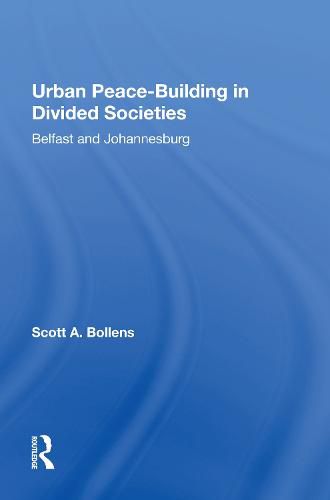Readings Newsletter
Become a Readings Member to make your shopping experience even easier.
Sign in or sign up for free!
You’re not far away from qualifying for FREE standard shipping within Australia
You’ve qualified for FREE standard shipping within Australia
The cart is loading…






Urban Peacebuilding in Divided Societies explores the effects of urban policy and planning in the management of ethnic conflict in strife-torn societies, focusing on the cases of Belfast and Johannesburg. It combines perspectives from urban geography, political science, social psychology, and urban planning to study the relationship between ethnic ideologies and the urban strategies that affect ethnic territoriality in the form of urban land use, housing, economic development, services, and citizen involvement. The book contrasts Belfast, embedded within an uncertain shift from conflict to political settlement, with Johannesburg, engaged in post-resolution reconciliation, to analyze, along different points of societal transition, the contributions of urban policymaking to peacemaking and peacebuilding. It describes the differing rolesobstructive or facilitativethat contested cities can play amidst broader peacemaking efforts, consistent with Bollens contention that there are lessons in urban peacebuilding for constructing mutually tolerable living environments at the regional and national levels. Effectively, cities (and urban policies) are the locus for operationalizing national ideologies of ethnic coexistence. } Urban Peacebuilding in Divided Societies explores the effects of urban policy and planning in the management of ethnic conflict in strife-torn societies, focusing on the cases of Belfast and Johannesburg. It combines perspectives from urban geography, political science, social psychology, and urban planning to study the relationship between ethnic ideologies and the urban strategies that affect ethnic territoriality in the form of urban land use, housing, economic development, services, and citizen involvement. The book contrasts Belfast, embedded within an uncertain shift from conflict to political settlement, with Johannesburg, engaged in post-resolution reconciliation, to analyze, along different points of societal transition, the contributions of urban policymaking to peacemaking and peacebuilding. It describes the differing rolesobstructive or facilitativethat contested cities can play amidst broader peacemaking efforts, consistent with Bollens contention that there are lessons in urban peacebuilding for constructing mutually tolerable living environments at the regional and national levels. Effectively, cities (and urban policies) are the locus for operationalizing national ideologies of ethnic coexistence.}
$9.00 standard shipping within Australia
FREE standard shipping within Australia for orders over $100.00
Express & International shipping calculated at checkout
Urban Peacebuilding in Divided Societies explores the effects of urban policy and planning in the management of ethnic conflict in strife-torn societies, focusing on the cases of Belfast and Johannesburg. It combines perspectives from urban geography, political science, social psychology, and urban planning to study the relationship between ethnic ideologies and the urban strategies that affect ethnic territoriality in the form of urban land use, housing, economic development, services, and citizen involvement. The book contrasts Belfast, embedded within an uncertain shift from conflict to political settlement, with Johannesburg, engaged in post-resolution reconciliation, to analyze, along different points of societal transition, the contributions of urban policymaking to peacemaking and peacebuilding. It describes the differing rolesobstructive or facilitativethat contested cities can play amidst broader peacemaking efforts, consistent with Bollens contention that there are lessons in urban peacebuilding for constructing mutually tolerable living environments at the regional and national levels. Effectively, cities (and urban policies) are the locus for operationalizing national ideologies of ethnic coexistence. } Urban Peacebuilding in Divided Societies explores the effects of urban policy and planning in the management of ethnic conflict in strife-torn societies, focusing on the cases of Belfast and Johannesburg. It combines perspectives from urban geography, political science, social psychology, and urban planning to study the relationship between ethnic ideologies and the urban strategies that affect ethnic territoriality in the form of urban land use, housing, economic development, services, and citizen involvement. The book contrasts Belfast, embedded within an uncertain shift from conflict to political settlement, with Johannesburg, engaged in post-resolution reconciliation, to analyze, along different points of societal transition, the contributions of urban policymaking to peacemaking and peacebuilding. It describes the differing rolesobstructive or facilitativethat contested cities can play amidst broader peacemaking efforts, consistent with Bollens contention that there are lessons in urban peacebuilding for constructing mutually tolerable living environments at the regional and national levels. Effectively, cities (and urban policies) are the locus for operationalizing national ideologies of ethnic coexistence.}